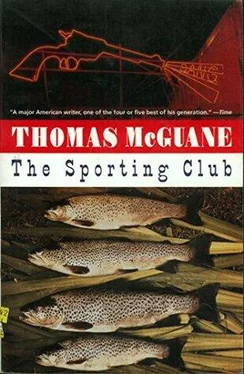Some time passed, probably hours, and Quinn awoke. It was very dark. The moon was invisible though its cold, chalky light hung over the trees. Quinn lifted his hands to his face. It was swollen and enormous. Bites had made its surface pebbly. He touched his lips and found them taut as the skin of a balloon. The sides of his finger pressed apart just as his mouth seemed to press open. Every move sent clouds of saclike mosquitos rising from his flesh and oscillating around him in soft waves of high-pitched sound. The river had fallen to normal and whispered past. Quinn got to his feet, sinking halfway to his knees in the mud, launching new clouds of mosquitoes up and streaming against the moonlight. He looked around himself. Everything was gone. His good rod was gone; he thought with helpless absurdity what a time he was having and how he had rewarded himself for a year’s stupid labor. He felt solitary and ashamed at this moment of saurian floundering, muckbound helplessness and stupidity. All present hopes of pleasure were extinct and in their absence he thought he could make out the few, clear lines that kept himself, Stanton, Janey, everybody, precisely separated. The thought was subtle and insistent. Calamity had deprived him of his bland vacation. What remained, the accretion of the last weeks, was knowledge as clear as a simple geometric pattern, a few lines: final and sad.
HE OPENED the screen door, bumping his face as he went in, wandering through the wrong rooms on the ground floor of his own house before turning on lights and going upstairs to bed. On his back, his eyes hung from the ceiling light with its seamed, dusty, spilling glass cornucopia. His fingers beat with itching and he wanted to claw them, claw his beaded face and membrane lips. He got up and went to the sink and ran hot water on his hands for relief. Shortly after he lay down again, his view of the light was interrupted by the heads of Stanton and Janey. “What happened to you?”
“I was in the river. I was … knocked down by a wall of water.”
Stanton said Olive had blown the dam and that it had all run down the tributary stream that drained it into the river. With one blast the lake had become a clearing. Dynamite. Stuff for blowing stumps. Stanton wanted to know what it was like, if it was exciting.
“A wall, I told you.”
“You fortunate bastard. That was absolutely the last view of the lake anybody had.” Janey said he looked sick.
“I am. I can’t be brave. I’ve never felt this way before.” He dozed off as though he were hurtling away and woke up a moment later in fear and lay in bed awake, feeling still a pull to hurtle into the night sky that tugged all around him elastically. He realized that the roar outside that seemed like wind was voices and he forced himself to get out of bed, feeling the pressure of his puffy feet run up his legs when his weight was on the floor. Turning the brass levers on the narrow-paned windows that stretched from floor to ceiling, he swung them down and stepped onto the narrow widow’s walk where, in the daylight, the lake used to be visible. Below Quinn, directly in front of the porch, were all the men of the club. They were crowded together in a single unit. Fortescue stood in front of them, Scott behind. Except that the recruits already had guns, it would have looked like an induction center. Their lights and lanterns flashed and glowed and in every hand was a rifle of some kind: carbines, pump guns, doubles, Mausers. It was a manhunt, a posse, and Quinn knew that it was poor Earl Olive, purveyor of live bait, who starred in the show. He studied them unsteadily. They were arguing. Fortescue was plunging an admonitory forefinger downward as though he had found oil, and Stanton, now below too, was cultivating a judicial air that was having no effect beyond irritation. Scott darted through the ranks shaping everyone up, and Murray led a small band in sentimental songs of the forties. Then Fortescue was finished, had forged these men into something of use, and they turned as a man and surged into the darkness with a roar of elation, their lamps flashing and working into the night. Quinn went back to bed, forgetting to turn out the light. He looked at it in despair, unwilling to get up again. When he opened his eyes it was morning and Janey was sitting beside a tall, shocking stripe of sky. Around her neck hung a pair of binoculars. Quinn’s hands had perspired so much the skin felt tender and porous as though he’d been swimming. When Janey saw he was awake, she began to tell him about the night before: Earl Olive had got away.
Quinn remembered the beginning of the man hunt, remembered the rifles, lights, shouting. And through Janey he learned that that’s all there had been, a beginning. The war party fording the first swamp, guns held crossways over their heads as at Parris Island, had, floundering and crying to each other for aid, heard, from behind, the successive dynamitings of each room of the main lodge; each explosion was louder than the one before either because of increasing charges or because the building had grown more sonorous with each gutting blast, each bellowing, plank-shattering cough of dynamite. Scott, according to Spengler, the chronicler, had, running about in confusion chest-deep in ooze, slogged a short way and vanished; dragged to high land, he had been mounted by Charles Murray who, Scott’s fists unavailing, mouth-to-mouth resuscitated the little drenched antiquarian until Fortescue pulled him off and said, “Easy now. That’ll do.” Scott jumped up screaming in a gallinaceous rage that was quelled only by the return march to the compound where they viewed the ruins, the burst walls and tall rooms opened to the sky for the first time in the century. Fortescue walked around in front of his men and addressed them thus: “Gentlemen—” But his speech was precisely interrupted by a single small blast toward the lake. Fortescue, racing along behind the other men, swung his arm in a forward quarter-arc and cried “Follow me!” as they began to outdistance him. When they arrived at the lake, they found someone had dynamited the lifeguard tower; the seat had been blown fifty yards away and sat brightly on the dry lake bed. They decided to convene. They would have to devise some systematic mode of procedure; it was not to be expected that normally sedentary gentlemen should run up and down the countryside indefinitely. Fortescue moved to the fore. “Gentlemen—” he pleaded; but he was interrupted by a very small explosion from the direction they had come from and soon he was outdistanced by his companions. When they arrived again at the compound, they learned that the flagpole had been rather exactly dynamited. This time Fortescue began to screech. And Scott, now wearing a Mae West, tried to talk sense to him. But Fortescue continued to screech about advancing, flanking, fanning out and bivouacking. And when they’d got him under control, they had lost their momentum and began to think of getting some rest.
Quinn stared from the window. Where the blue lake had been in the trees was now a brownish green oval as sore as a roller rink. Clouds of crows whirled and flew, landed and fed on dead fish. Quinn took the field glasses and watched them plod over the lake bottom and pierce bloated trout with sudden thrusts of their heads. At the south end of the lake were the four rearing ponds that from this distance looked like ice trays. They still held water; but scrawny herons waded now and probed for young fish. To the left of Quinn’s field of view, you could normally see the third story of the lodge; now nothing was visible, no wreckage, nothing at all, as though the building had reared up above the surface of trees for a few generations and sounded.
Quinn moved to Stanton’s house, by his own request, where he could be more readily babied. They moved him into the spare room over the porch and he fell asleep instantly. When he awoke hours later, it was raining and Janey was there. The walls were invisible and the windows oblongs of dark-green ragged light. The weather made him daydream about Detroit, rain falling past office windows, rain stinking in the hearty woolens of Mary Beth, that Frankenstein, rain slanting into Woodward Avenue soaking shoppers in front of J. L. Hudson’s, gleaming on Michigan Avenue, Gratiot, Grand River, soaking merchants, strikers, bozos, flaneurs, autodidacts, doughty young executives and hurrying shoppers holding packages to their breasts like praying mantises. Rain that here in the North rinsed dust from trees, in Detroit raised an unseen, mobile filth; it exaggerated the noise of traffic, made the headlights of cars stream and wheel and haunt the crevasses between buildings. But here at least it didn’t seem like the last day there would be, the last emanation of gray light before the world went down gagging. Long spokes of sunlight already shot the clouds. “What are you waiting for?” Quinn asked.
Читать дальше












